Why Is Water Coming In My Basement Where The Walls Meet The Floor?
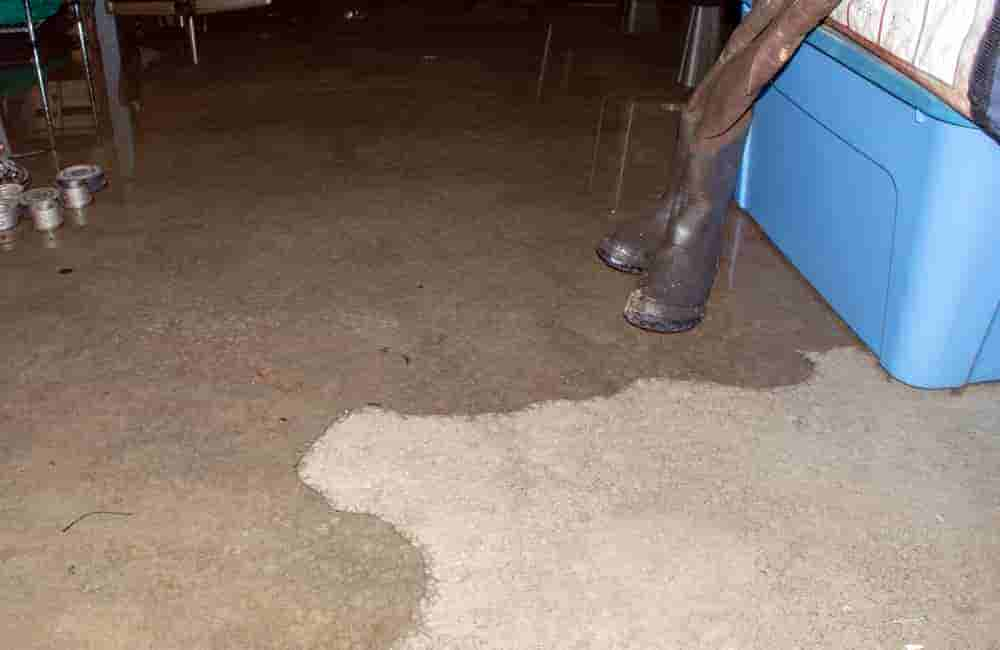
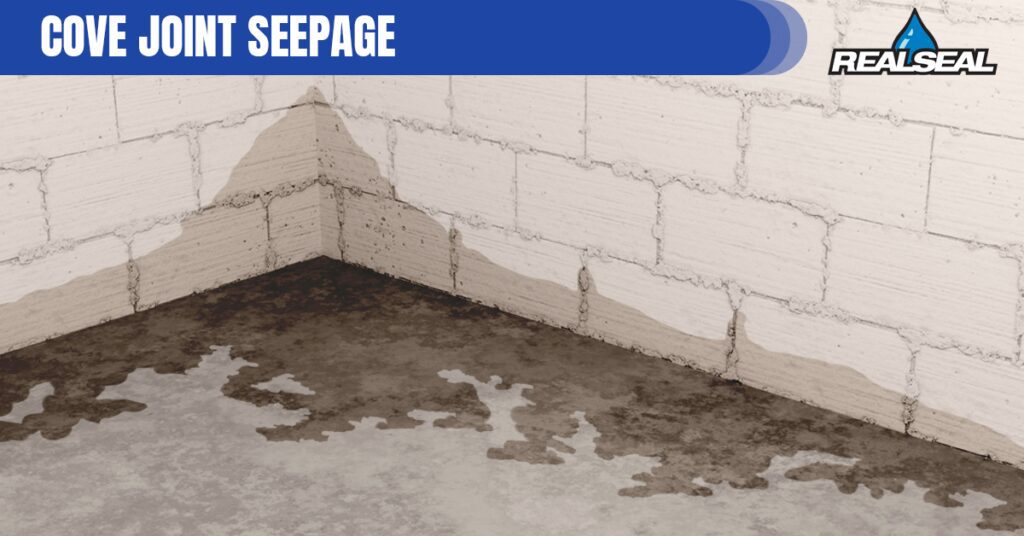
What Could This Lead To?
- Mold – Once humidity levels reach 70% in your basement, mold, and fungus can grow on your walls, floors, and anything else stored below your home.
- Musty odors – If your basement is damp and filled with mold, chances are it smells musty too.
- Wet floors – If your basement is too damp or humid, condensation can stick on your floors, leading to a potential slip and fall.
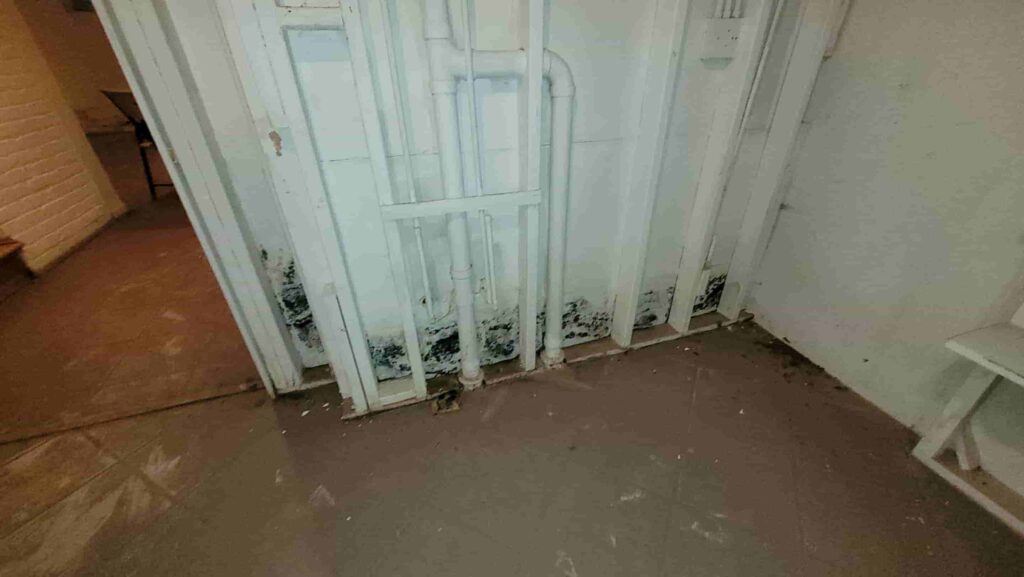
- Water damage or wood rot – If rot eats away at the wooden beams under your home, you could be looking at bigger problems than just a wet basement.
- Warped hardwood floors – If the floor above your basement is made of hardwood, there’s a possibility it can start to warp and bend due to rising moisture.
- Increased energy bills – When humidity builds up in your basement, it can rise into the rest of your home. This will force your air conditioning to work harder, leading to an increase in your utility bills.
- Increase in humidity – As we mentioned, the air below you will travel into the rest of your home. If your home is already humid during the summer months, chances are you don’t want it worsening due to a poorly sealed basement.
How Do I Stop Water Coming In Basement Where Walls Meet Floor?
The only way to stop water from coming into your basement, where your walls meet your floor, is by installing a drain tile system. You can also check if water is coming up from your basement floor and then take measures to prevent water from coming up from the basement floor. There’s no way to prevent water from soaking the soil near your foundation completely, but you can catch that built-up moisture and send it somewhere else. This is how a complete basement waterproofing system works.
- The vapor barrier – The first part of a complete basement waterproofing system, the vapor catches water seeping through your walls. When the moisture hits the vapor barrier, it drips down to the drain tile below.
- The drain tile – The second part involves a perforated pipe laid in a bed of washed stone. This pipe will collect moisture that’s dropped down from the vapor barrier and any water rising from the soil below it, preventing it from seeping through your cove joint.
- The sump pump – Once your drain tile collects the built-up moisture, it sends it to a sump pit (a hole in your basement floor). Inside this hole is a sump pump. This device detects when water reaches a certain level in the pit and ejects it away from your home.
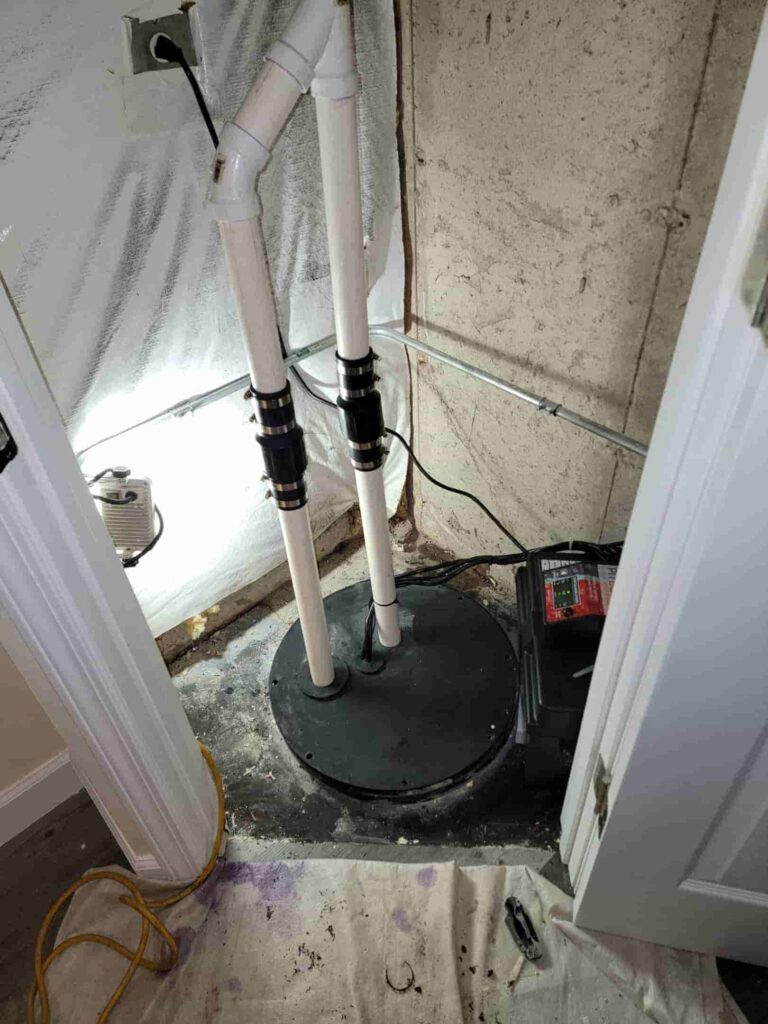
How Do I Prevent Water Coming In Basement Where Walls Meet Floor?
In order to prevent moisture from coming into your basement, you need to minimize how much saturates the soil outside your foundation. Here’s how.
- Your gutters – There’s no way to stop rain from pouring onto your house. That’s why your gutters are there. Their job is to prevent rain from dripping directly over the side of your home and eroding or seeping into the soil. By cleaning them regularly, you’ll prevent water from pouring over the sides. Professional waterproofing experts also recommend extending any downspouts, so they are at least 20 feet away from your home.
- Your grading – If your property is graded (sloped) toward your home, water could be draining into the soil outside your foundation. You can make minor adjustments yourself with a shovel and wheelbarrow, but we recommend calling a professional landscaper.
- Your yard – If your yard is very flat, chances are, during the rainy seasons, it turns into a swamp. If that’s the case, you might need a French drain. This perforated pipe works like a drain tile system and collects water that builds up in your yard, channeling it away from your home.
Who Can Help You?
If you have water coming into your Chicagoland basement, call The Real Seal Basement Waterproofing and Foundation Repair. We’ve been sealing and waterproofing thousands of basements, crawlspaces, and other types of foundations since 2011. Reach out to us today and schedule your free inspection for sealing basement leaks, where we’ll find out why your basement is seeping water where the wall meets the floor. We also provide foundation repair, concrete leveling, and more.
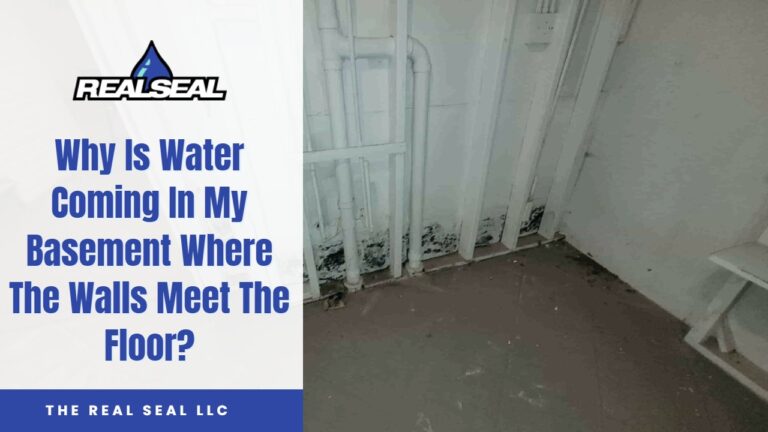
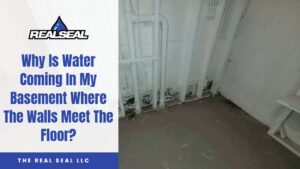
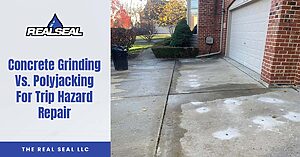
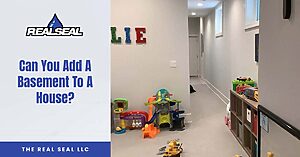
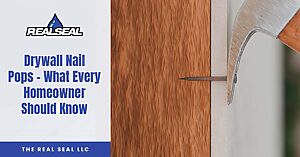
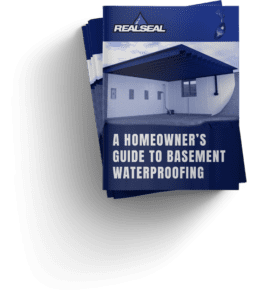

36 Responses
Very nice article, we also have same problem, hope it will get resolve via this article
Thanks Ken! Glad we could help and hope you found the resolution to your problem!
Hi Austin, my prob is basement under porch floor water goes under exterior wall then down via basement ceiling.
Floor is 3/4″tongue n groove. Wife and I spend every summer vaca caulking seams.
We’ve tried about all caulking, gorilla banana and,flex seal
Would like to find something that lasts longer or a true way to fix
Without explosions or chainsaws would be really appreciated.
Thanks for doing what you do.
God bless
Hi Ron! Well you went and had to take all the fun out of it by removing chainsaws and explosions.
So the water coming down the exterior wall can be coming from 2 main places. The first being where the top of the foundation wall meets the rest of the house. There is a seal that can be placed there that will stop water from coming over the top of the foundation.
The second place would be from through the ceiling itself. If the ceiling is leaking, you’ll need to remove the porch floor above and apply an epoxy sealer to stop the water from coming through the ceiling. You can then replace the flooring from there.
I’ve got a rock they left in the basement floor that couldn’t be removed and water is seeping through there. And you can see water on the cove joints too. We have 3 sides because the rear is open and yet water is still seeping. We have tiles and paint and all are well done. Yard is pitched and gutters run away and down.
Hi Ramsey!
Unfortunately some of the basement finishings are going to need to be removed, as it sounds like you need a Drain Tile System. Cove Joint Seepage as well as water coming through the basement floor is a tell-tale sign that you need to install a drainage system around the perimeter of the foundation. Even if it’s a walk-out basement, Drain Tile is still necessary to keep the 3 walls against dirt protected from seepage.
Do you ever work in California?
Hi Lisa, unfortunately we do not. But we do know 2 great contractors out that way! Bay Area Underpinning in the Sacramento area, and Dalinghaus Construction in the Los Angeles area. Are either of those close to you?
Hi
We have water coming in through the top of the frame of our window on the main floor as well as just below the window in the basement . I’m thinking it’s running down from the window and now running onto the basement door. Do you know what the problem might be?
Thanks!
Hi Jeannine!
It’s hard to diagnose without eyes-on, but if you are dealing with the same issue on both windows above and below the foundation, it would point more towards a siding/tuck pointing issue. You may need to re-do the flashing/seals of the windows as well. This would be the first step.
Hello, if you ever want to stay for free in a country side French house an jour and a half from Paris, i’ll let you stay for a defined période of time in échange for repairing my leaky basement.
Hello and thank you! Unfortunately we do not do work trades. Sorry!
Hello, we have water coming in at the seam between wall and floor, no rain for weeks and pump not running so can’t be a pipe. We’ve contacted the city as they have water lines near. They said its our downspouts, but again no rain for weeks.
Hi Manny!
Did the city come out to listen to the water line? Sometimes, a water line can burst/break outside your foundation and allow continuous water to seep in. They would have to make a physical inspection, and although it sounds weird, they take a stethoscope and listen to hear any leaking.
If they did that and the water line is not leaking, you may just be dealing with a high water table in the area. But it sounds more like a water line break.
They did not bring any stethoscope, they did not have one. There was not enough depth for them to collect a vial either, they have not been very helpful at all.
I’m sorry to hear that, Manny. If you go get one, it’s fairly easy to hear. But the village should really come out and get this taken care of for you.
Recommendations for someone to do this work in the rhode island area?
Hi Kiersten!
Yes, we would recommend Hugo with AM Shield Waterproofing. Hugo is great!
Any recommendations for the Milwaukee area?
Hi Debra!
Unfortunately we do not have anyone we know and trust up in Milwaukee. Best bet is to read reviews across all review sites (Yelp, Google, BBB, Angie’s) and go with the most consistent positive company. Be sure to read the negative reviews as well, they help you to see how a company will respond to an issue.
Hello Austin!
The article sheds lift on my issue. I own an old gas station building, turned into a deli and the cove leaking is horrible, sometimes up to 3 inches of water throughout the store. I know you are no where close to Pennsylvania, but can you recommend anyone in Eastern PA that does your kind of work to fix my seepage issue here in Milford, PA?
Hi Jennifer!
For Eastern PA, we recommend Worthington Waterproofing. A family owned business, and they truly care about their customers.
Hi, sewer water is seeping through my basement walls and eventually mixing with sump water which ends up in my bathroom and kitchen taps. How safe is it?
Hi Abhishek,
Are you sure your sump pump water goes to your bathroom and kitchen taps? That does not seem correct. If it is, you need to change that right away.
Any sewage coming into your basement is not good. You have a sewer break somewhere outside or under the foundation that is allowing the sewer water to mix with the storm water, and that needs to be fixed.
Hi! I’ve had rain water (not to much) come through the basement walls and possibly from the floor. A company came out and suggested they put a membrane blueskin on the outside. They dug outside and put it up. Just last night we had heavy rain and again I noticed water in the basement… What am I doing wrong?
Hi Kevin!
It’s nothing you’re doing wrong, but water can come in through multiple places. Did the company also install a Drain Tile System? Do you have brick siding? How are the seals around your windows and doors outside?
Hi I’ve just notice some wetness in my basement after a heavy thunderstorm night it’s not a lot but it’s some and don’t want it to become worse but it’s like at the bottom of the wall and where the floor meet didn’t really notice none on the wall but it’s like in the middle of the house in the Basement right where our connect garage is idk if it’s coming from the floor or the wall
Hi Josh,
That’s a long sentence! I’m sorry you’re dealing with the water. If you didn’t notice any water on the wall, it is likely cove joint seepage. Best way to make sure where it is coming from is to go see it when it is leaking. If you do not have a sump pump or Drain Tile System, it may be necessary to install them in order to stop the water.
Thank you for this article on behalf of basement dwellers everywhere. Any recommendations for companies in or near New Haven, CT?
Glad you found it useful, Joe!
Unfortunately we do not have anyone we know/recommend in New Haven. Best bet is to compare (and read) reviews across a few different sites like BBB, Yelp, Google, Angie’s to find the most consistent reputation.
Hi Austin, thanks for the great article. I’ve been dealing with cove leaking in one corner of my basement. We used to get much more water but re-graded around the perimeter of the house a few years back, new down spouts and sump line and that did the trick for quite a while, but here we are again. Question is, the corner leaking is where the attached garage above meets the house. If the drain tile at the foundation wall is damaged or needs to be replaced, how is that done without undermining the garage slab? We’re just over the WI/IL border in Kenosha area. Do you work up this way or know a reputable company that does? Thanks again!
Hi Heather!
We do work up in that area, give us a call! 847-756-7987
Nowadays, Drain Tile Systems are installed on the interior of the basement. It isn’t necessary to fix/repair the original Exterior Drain Tile. Once the new Interior Drain Tile is installed, the water will stop!
I just bought a home and was told there was only moisture in the basement with heavy rain. The first rain, 2 weeks after moving in, the basement had puddles of standing water on one side. It was clearly leaking. Moisture would be taking a hot shower and humidity or moisture appearing on the mirror; not standing water on the floor during my shower and following my shower. That, to me, indicates a leak. Please explain the difference between moisture and water intrusion. Also, how can you tell how long something like this has been going on? The sellers signed a disclosure stating that there was nothing wrong with the property that they were aware of. Clearly, it rained while they lived here 2.5 years. It rained within less than a month once we moved in. I need proof. Please help.
Hi Krista!
Sorry you’re dealing with this. We run into this situation quite often. The terms “moisture” and “water intrusion” can be interpreted in different ways. When it comes to the disclosure the homeowner signs, it is specifically geared towards the homeowner being *aware* of any issues. This is historically very difficult to prove.
Let me paint you a picture. An old couple has the basement filled with boxes and isn’t aware of the leak, and it leaks after the new buyers move in. This would not violate that statement.
Another scenario, the previous homeowner gets estimates for leaks from companies, knows there is an issue that should be fixed, and decides to do nothing and sign that statement. This is in violation of the statement.
The problem is, how do you prove they knew of the issue? Mostly, you’d have to make them admit it. And they won’t be doing that. But, you can call local waterproofing companies and see if they’ve been out to your address before and request that info and a new evaluation. I have seen that proof come to fruition in court.
However, the vast majority of the cases just simply aren’t worth pursuing and unless the previous homeowner admits fault, it’s difficult to prove.
If they did state that there was moisture with heavy rain, this can be argued that they did disclose it. Either way, it’s an uphill battle.
I know this is not what you want to hear, and it frustrates us as well, as we run into this far too often. So it comes down to what disclosure they signed, what they knew about, and most importantly, what you can prove. Even if you can prove that the moisture/intrusion existed for years, you still have to prove they knew about it and intentionally hid it.
Can you recommend anyone in eastern Connecticut? I have some moisture seepage at the cove joints in the bilco area and efflorescence in the basement. Thank you for your article; it was very helpful!
Unfortunately we do not know anyone in that area. Best shot is to compare reviews across multiple sites to find the most consistent reputable contractor in your area.